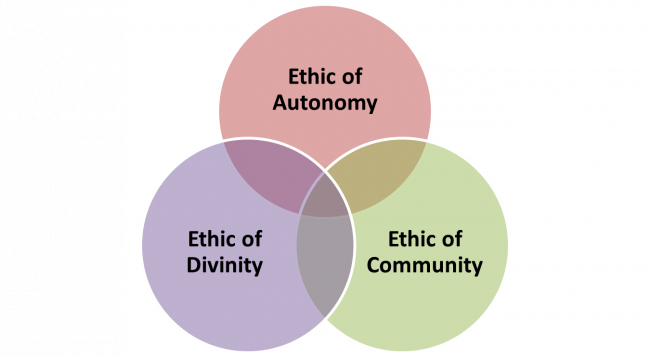Cultural Alternatives to Moral Development
Shweder and colleagues (1984; 1987) proposed a new model of ethics that address concepts consistent with the moral belief systems of many cultures and not restricted to Western values of autonomy and individual rights. Cultural anthropologists and some cultural psychologists argue that morality is not always universal but rather unique cultural experiences shape views of fairness, morality and justice. Using fieldwork in India with adults and children of the Brahman class (sometimes referred to as the untouchables), Shweder and colleagues found that Western morality of harm avoidance and individual rights was insufficient and neglected other cultural definitions of morality and so created the Three Ethic Model of Morality:
- Ethic of Autonomy most closely aligns with Kohlberg’s theory of morality with an emphasis on harm, rights, justice and personal autonomy. Principles of fairness emerge very early in development, prior to socialization influences (Wainryb, 2006; Sunbar, 2018). Children in diverse cultures such as the United States, India, China, Turkey, and Brazil share a pervasive view about upholding fairness and the wrongfulness of inflicting harm on others (Wainryb, 2006).
- Ethic of Community refers to being part of an organized community and recognizing that you have a social role within that community. This ethnic encompasses relationships, social obligations, duty, hierarchy and interdependence on community members.
- Ethic of Divinity addresses our relationship with a higher power, divinity, the sacred, godliness and the order of the natural world.
 Cross-cultural research has found support for the Three Ethic Model of Morality and the role of culture and moral judgment across different populations (Haidt, Koller & Dias, 1993). Haidt and colleagues found that children and adults in the United States and individuals with high socioeconomic status (SES) provided responses more consistent with ethics of autonomy than community or divinity. Samples of children and adults from Brazil had broader definitions of morality that extended beyond harm and autonomy.
Cross-cultural research has found support for the Three Ethic Model of Morality and the role of culture and moral judgment across different populations (Haidt, Koller & Dias, 1993). Haidt and colleagues found that children and adults in the United States and individuals with high socioeconomic status (SES) provided responses more consistent with ethics of autonomy than community or divinity. Samples of children and adults from Brazil had broader definitions of morality that extended beyond harm and autonomy.
Intracultural research within the United States has found that political liberals and conservatives emphasize different moral foundations with regard to harm and fairness (Graham, Haidt, & Nosek, 2009). The moral foundations of the groups were the same (no real moral differences between the political groups) but the degree of endorsement for some morals was significantly different for political conservatives and liberals.

